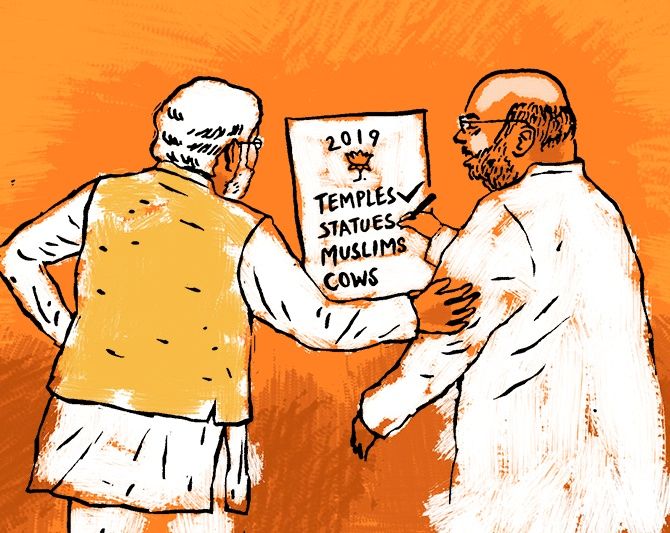
by Arnab Baidya 25 October 2023
In the early months of 2023, India witnessed a troubling surge in incidents of hate speech, primarily targeting its Muslim minority population. This article aims to dissect the documented cases of these events, delve into the factors that have fueled their increase, and explore the potential implications for Indian society and politics. While India does not have an official definition of hate speech, we adopt the United Nations framework, which characterizes it as any form of communication—oral, written, or behavioral—that employs prejudiced or discriminatory language directed at individuals or groups based on attributes like religion, ethnicity, nationality, race, color, descent, gender, or other identity factors. Our analysis encompasses a spectrum of hate speech, including direct calls to violence, economic boycotts, and the dissemination of conspiracy theories aimed at stigmatizing and marginalizing religious minorities.
The surge in hate speech within India is a deeply concerning trend that has been on the rise since 2014, coinciding with the ascent of the Hindu-nationalist Bharatiya Janata Party (BJP) to power. This period has witnessed not only a proliferation of hate speech but also the active participation of government officials in propagating such rhetoric. It’s crucial to understand that hate speech is far from a theoretical debate on the boundaries of free speech; it has real-world consequences.
Hate speech disrupts the daily lives of people, destabilizes communities, incites violence, and has often culminated in deadly riots targeting marginalized groups. What makes this issue even more alarming is that it’s not an isolated problem but represents a systemic challenge. The incidents of hate speech have been consistently on the rise, and the first half of 2023 was no exception.
During this period, a staggering 255 recorded instances of hate speech gatherings or rallies targeting Muslims took place across 17 states, including the National Capital Territory of Delhi and the Union Territory of Jammu and Kashmir. This shocking statistic translates to more than one anti-Muslim hate speech event occurring daily. What’s particularly noteworthy is the geographic distribution of these events; a significant 80% unfolded in states governed by the BJP, shedding light on the party’s complicity in or tolerance of such activities. States like Maharashtra, Karnataka, Madhya Pradesh, Rajasthan, and Gujarat bore the brunt, with Maharashtra alone accounting for 29% of these incidents. Remarkably, seven out of the top eight states with the highest number of hate speech events were under BJP rule or its coalition partners.
Approximately 52% of these gatherings in BJP-ruled states and union territories were organized by entities affiliated with the Rashtriya Swayamsevak Sangh (RSS), including organizations like the Vishwa Hindu Parishad (VHP), the Bajrang Dal, the Sakal Hindu Samaj, and even the Bharatiya Janata Party itself. In total, 42% of all hate speech gatherings across the 17 states and union territories were organized by groups linked to the RSS.
One deeply concerning aspect of these hate speech events is their reliance on dangerous conspiracy theories targeting Muslims. Around 64% of events in BJP-ruled states and union territories incorporated references to popular Hindu far-right anti-Muslim conspiracy theories like “Love Jihad,” “Land Jihad,” and “Vyapar Jihad.” These theories further stigmatize and isolate the Muslim community. Overall, 51% of all hate speech gatherings in these 17 states and union territories featured anti-Muslim conspiracy theories.
Moreover, an alarming 33% of these gatherings explicitly called for violence against Muslims, intensifying the gravity of the hateful rhetoric. About 11% of events included explicit calls for Hindus to boycott Muslims, deepening societal divisions. Disturbingly, 4% of all events featured hate-filled and sexist speeches explicitly targeting Muslim women, magnifying the discrimination faced by this vulnerable group. Nearly 12% of events featured calls to arms, exacerbating the potential for violence.
The timing and distribution of these hate speech events raise questions about their political motives. Notably, 33% of them occurred in states that had already conducted or were set to conduct state legislative elections in 2023. Additionally, over 36% of these events took place in states slated to hold legislative elections in 2024. In total, nearly 70% of these events occurred in states with legislative elections either in 2023 or 2024, indicating the possible exploitation of hate speech for voter mobilization.
The surge in hate speech events targeting India’s Muslim minority in the first half of 2023 paints a grim picture of the state of social cohesion and political discourse in the country. It underscores the urgent need for action to counter the spread of hate speech and its dangerous consequences. Addressing this issue demands vigilance and concerted efforts from all segments of society, including the political establishment, to promote tolerance, inclusivity, and respect for diversity. Failure to do so risks further division and unrest in India, a nation renowned for its pluralistic ethos and commitment to secularism.
